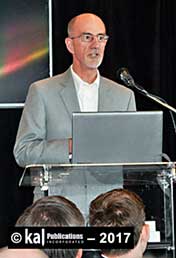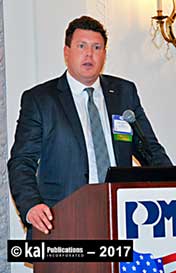
December 2017 Issue Highlights
For more complete coverage, send us an e-mail to
request a back
issue.

For more complete coverage, send us an e-mail to
request a back
issue.

InterState Oil Swing for the Wish

Fiedler Group 60th Anniversary

Petroleum Marketers Association of America Fall Meeting
Want to see the photos that didn't make the issue? Check out the Cutting Room Floor.
Maverik Installs Electric Vehicle Chargers
L.A. Port Plan Calls for No Diesel
Fresno Truck Stop Closed to Make Way for Rail
SALT LAKE CITY, UT. — Maverik Inc., has installed electric vehicles chargers at their stations in Fillmore and Washington, UT., to launch the "Mighty Five Electric Vehicle Corridor Initiative."
The Initiative, launched in conjunction with Utah Governor's Office of Energy Development (OED) and the Utah Clean Air Partnership (UCAIR), was created to make it possible for drivers of electric vehicles to travel from Salt Lake City to Utah's national parks.
"We're super excited to partner on this initiative," said Andre Lortz, Maverik's chief financial officer, announcing the installation. "Electric car demand is growing and we're happy to help fuel people on their route to adventure. Especially the natural parks in our own backyard."
The EV chargers, which were placed in August, were funded by a UCAIR grant matched by OED and Maverik. Both of the Maverik station locations now have a DC Fast Charger and a Level 2 EV Charger available to drivers.
LONG BEACH, CA. — The Ports of Long Beach and Los Angeles have launched a new Clean Air Action Plan that calls for replacing diesel trucks and cargo equipment with zero-emissions technology over the next twenty years.
The cost of implementing the plan is estimated at $14 billion from public and private sources.
The Ports of Long Beach and Los Angeles make up the nation's largest port complex, handling approximately 40% of U.S. imports. The volume of goods moving through the ports has tripled since the mid-1990s, increasing emissions from the diesel-powered cargo handling equipment at the ports as well as from the ships and trucks servicing the ports.
Currently, approximately 70% of the equipment at the ports — including cranes, forklifts, yard tractors, and other heavy equipment — is powered by diesel, followed by propane. Electric, natural gas, and gasoline combined power less than 10% of the equipment.
The new Clean Air Action Plan would mandate the use of zero-emission cargo-handling equipment by 2030 and trucks by 2035. A key component to the plan is a "Clean Trucks Program" which would require big rigs entering the ports' registry to have engines of model year 2014 or newer, effective as of 2018. By 2023, new trucks joining the registry would have to meet a stricter, near-zero-emissions standard. Trucks that are unable to meet the engine year or emissions standards would be charged a fee to enter port terminals.
By 2035, only zero-emission vehicles would be exempted from those charges.
It also set targets to cut port-related greenhouse gas emissions to 40% below 1990 levels by 2030, and to 80% by 2050.
According to port records, 96% of trucks serving the complex run on diesel. There are only three electric or hybrid vehicles among the more than 17,000 active big rigs at the facilities. Less than 9% of the ports' current terminal equipment meets the zero-emissions standards.
"These ports are going where no port has gone before," said Port of Los Angeles Executive Director Gene Seroka. "We're ready to make history again, looking at a new array of technologies and strategies to further lower port-related emissions in the decades ahead."
After reviewing the Clean Air Action Plan, both industry leaders and environmentalists questioned how "the thousands of new trucks and pieces of equipment would be paid for" as well as the realism of the timeline outlined in the plan.
"The plan relies too heavily on yet-to-be-developed state regulations, millions in yet-to-be-located subsidies and voluntary programs," said Melissa Lin Perrella, an attorney with the Natural Resources Defense Council. "At the end of the day, we have to ask if the words on paper will make the air safe to breathe. The plan is not there yet."
Business owners argued that the Clean Air Action Plan puts too heavy a financial burden on both trucking companies and the Southern California economy, giving other seaports a competitive advantage. They also noted that trucking companies continue to make investments in clean vehicles, but the inventory and the money necessary to buy new trucks aren't available.
Weston LaBar, executive director of the Harbor Trucking Association, noted that it was crucial "that we don't saddle an industry that has invested billions of dollars in clean technology with a mandate that is not viable commercially or operationally."
FRESNO, CA. — A historic truck stop off Highway 99 here has been shuttered by the State of California as part of its plans to bring high speed rail to the area.
Kleins Truck Stop, located at 6725 N. Golden State Blvd., was acquired under eminent domain by California in August.
The Fresno "landmark" included gasoline and diesel sales, a convenience store, and a small cafe which was known for its chili and its biscuits and gravy.
Caltrans has taken over the property and is demolishing the buildings on the site.
Originally published in the December 2017 issue of O&A Marketing
News.
Copyright 2017 by KAL Publications Inc.
Serving the 13 Western States, the World's Largest Gasoline, Oil, Fuel, TBA and Automotive Service Market